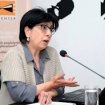The Karabakh Conflict in the Context of Political Processes in Armenia and Azerbaijan - 2018: Page 4 of 11
are nothing more than a declaration. The question is not about what the parties will do, but how they will speak about it.
Laura Baghdasaryan - I want to draw your attention to Gela Vasadze's statement about the importance of deciding what to speak in this case. I assume, in order to justify future or already implemented actions on the front line. In this regard, I would like to draw a parallel with the actions of Georgia towards Abkhazia. Georgia had never refused direct talks with representatives of Abkhazia until 08.08.08. And even after Russia recognized the independence of Abkhazia and South Ossetia, attempts have been undertaken in Georgia to establish contacts with Abkhazia and South Ossetia, and there is even a Ministry of Reintegration. Although, for Georgia, Russia still remains an aggressor that has seized two regions. Does not such a discrepancy in the behaviours of Azerbaijan and Georgia imply anything for you?
For example, Azerbaijan categorically refuses to have any contacts with the Karabakh people, and prefers negotiations with Armenia, not only to reinforce its thesis that Armenia is an aggressor, its armed forces are located on the territory of Karabakh, etc., not only because of fear of the legitimization of Karabakh authorities, but also because of the intention to maintain their authoritarian power within the country. It is clear that there will be no possibility of adhering to Azerbaijan's authoritarianism in Karabakh.
Obviously, the model of Azerbaijani authoritarianism can't be attractive for Karabakh. Georgia does not have and has never had such kind of a problem since 2003. What do you think?
Gela Vasadze – Laura raised an interesting question about the differences in the approaches of Georgia and Azerbaijan to direct contacts.
The main thing is that in the Georgian society conflicts in Abkhazia and Tskhinvali region (South Ossetia - editor) have never been perceived as ethnic, that is, in the perception of the overwhelming majority this was not a conflict between Georgians and Abkhazians, or between Georgians and Ossetians. And until 2008, the existing situation has been perceived as the result of Russia's policy, therefore, ties with Abkhazians and Ossetians were generally welcomed by the society as a way of settlement. The situation has not changed after 2008. Of course, there are skeptics, but the steps taken by the authorities to build trust are largely positively evaluated by both the society and the western partners of Georgia.
Military actions in the conflict zones lasted very short - in 1991-92 in the Tskhinvali region, in 1992-93 in Abkhazia, in 2005 and 2008 in the Tskhinvali region, the rest of the time a truce was established during which the citizens have been travelling across, trade with one another, arrive in Tbilisi for medical treatment. In Karabakh there is a front line, and military operations of low intensity are conducted almost constantly. These two factors have predetermined the impossibility for Baku to adopt the "Georgian" approach.
Arif Yunusov - To a certain extent, I agree with this conclusion of Gela Vasadze. I would add only that in Georgia, although the







 +37410 563363
+37410 563363
 1/3 Buzand Str, 8 Floor, Yerevan, Armenia
1/3 Buzand Str, 8 Floor, Yerevan, Armenia